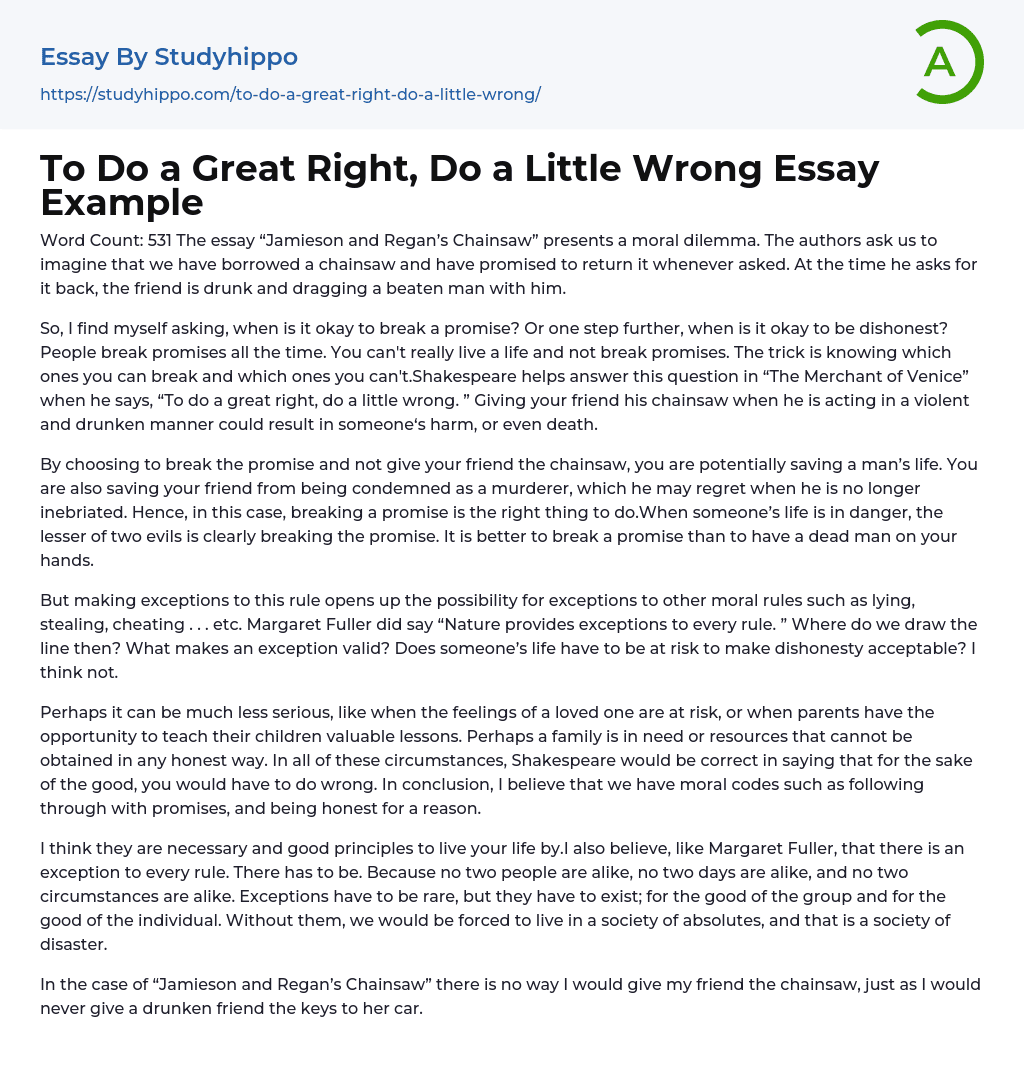Word Count: 531 The essay “Jamieson and Regan’s Chainsaw” presents a moral dilemma. The authors ask us to imagine that we have borrowed a chainsaw and have promised to return it whenever asked. At the time he asks for it back, the friend is drunk and dragging a beaten man with him.
So, I find myself asking, when is it okay to break a promise? Or one step further, when is it okay to be dishonest? People break promises all the time. You can't really live a life and not break promises. The trick is knowing which ones you can break and which ones you can't.Shakespeare helps answer this question in “The Merchant of Venice” when he says, “To do a great right, do a little wrong. ” Giving your friend his chainsaw when he is acting in a violent
...and drunken manner could result in someone‘s harm, or even death.
By choosing to break the promise and not give your friend the chainsaw, you are potentially saving a man’s life. You are also saving your friend from being condemned as a murderer, which he may regret when he is no longer inebriated. Hence, in this case, breaking a promise is the right thing to do.When someone’s life is in danger, the lesser of two evils is clearly breaking the promise. It is better to break a promise than to have a dead man on your hands.
But making exceptions to this rule opens up the possibility for exceptions to other moral rules such as lying, stealing, cheating . . . etc. Margaret Fuller did say “Nature provides exceptions to every rule. ” Where d
we draw the line then? What makes an exception valid? Does someone’s life have to be at risk to make dishonesty acceptable? I think not.
Perhaps it can be much less serious, like when the feelings of a loved one are at risk, or when parents have the opportunity to teach their children valuable lessons. Perhaps a family is in need or resources that cannot be obtained in any honest way. In all of these circumstances, Shakespeare would be correct in saying that for the sake of the good, you would have to do wrong. In conclusion, I believe that we have moral codes such as following through with promises, and being honest for a reason.
I think they are necessary and good principles to live your life by.I also believe, like Margaret Fuller, that there is an exception to every rule. There has to be. Because no two people are alike, no two days are alike, and no two circumstances are alike. Exceptions have to be rare, but they have to exist; for the good of the group and for the good of the individual. Without them, we would be forced to live in a society of absolutes, and that is a society of disaster.
In the case of “Jamieson and Regan’s Chainsaw” there is no way I would give my friend the chainsaw, just as I would never give a drunken friend the keys to her car.
- Rabbit essays
- Distribution essays
- Large Animals essays
- Mouse essays
- Poultry essays
- Animal Abuse essays
- Cats Vs Dogs essays
- Cattle essays
- Territory essays
- Values of Life essays
- Ethical dilemma essays
- Normative Ethics essays
- Virtue Ethics essays
- Belief essays
- Deontology essays
- Moral essays
- Virtue essays
- Work Ethic essays
- Agriculture essays
- Albert einstein essays
- Animals essays
- Archaeology essays
- Bear essays
- Biology essays
- Birds essays
- Butterfly essays
- Cat essays
- Charles Darwin essays
- Chemistry essays
- Dinosaur essays
- Discovery essays
- Dolphin essays
- Elephant essays
- Eli Whitney essays
- Environmental Science essays
- Evolution essays
- Fish essays
- Genetics essays
- Horse essays
- Human Evolution essays
- Isaac Newton essays
- Journal essays
- Linguistics essays
- Lion essays
- Logic essays
- Mars essays
- Methodology essays
- Mineralogy essays
- Monkey essays
- Moon essays




